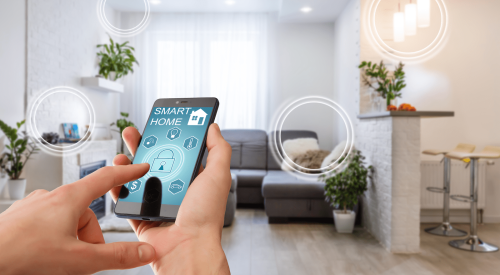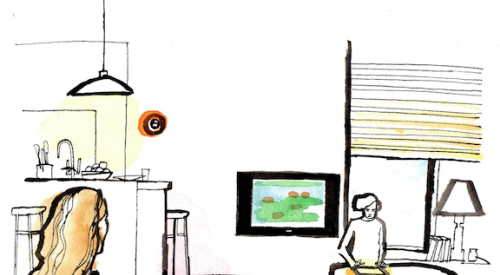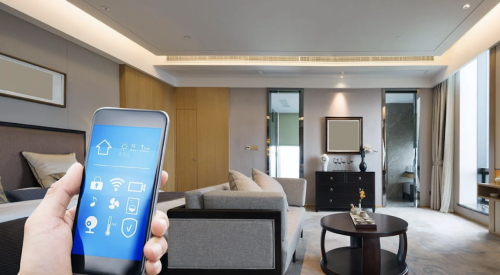Copyright 2005 Ventura County Star
All Rights Reserved
Ventura County Star (California)
February 6, 2005 Sunday
BUSINESS AND STOCKS
576 words
David Bradley
AP Weekly Features
New homes with a mind of their own may seem futuristic to homeowners, but not to the nation's home builders.
According to a survey of more than 1,000 home builders, the reality of the "smart home" is here and now.
A majority of builders -- nearly two in three -- say they already construct homes with an eye on "smart home" technology as it exists now and how it may yet evolve. The idea of ordering your oven to preheat as you sit in an office or turning on lights and adjusting thermostats as you're stuck in traffic will be commonplace, along with dozens if not hundreds of other in-home possibilities.
The survey, by home center retailer Lowe's, is a sign that high-tech homes are going mainstream in the housing sector.
According to David Steed, senior vice president of merchandising for Lowe's, that builders have warmed to creation of homes in sync with laptops or programmed for household functions is evidence that homeowners best be aware of more than bricks and mortar as they build their next home or undertake a major home renovation.
"Builders are keenly aware of how their business is changing and being driven by technology considerations," Steed says. "It's not a trend as much as it is simply the way home building is going."
Yet homeowners aren't in the dark about the enlightened possibilities. Some 51 percent of builders say their customers ask for the technology now.
And the pace of smart home technology seems poised to rapidly gain greater steam. The majority of builders see smart homes as having already arrived or just a few years away from catching on across the housing spectrum. Only 14 percent think the concept is five or more years away from widespread acceptance.
Right now, smart home technology centers on preparing a home to accept -- or be ready to accept -- various technologies.
Scott Goodelle, of Pass and Seymour, a supplier of what is described as high function junction boxes that bundle phone, broadcast and Internet technology through one spot in the house, says houses today offer "structured wiring," meaning that builders run high-capacity cables throughout the home to link rooms, appliances and entertainment devices. He suggests builders include additional wiring capacity during construction or remodeling so the home is ready to adapt as technologies and needs change.
Just how and when those changes occur is anyone's guess. Steed of Lowe's says that while beefed-up wiring in a home seems simple, having it centralized with easy access for upgrades and adaptations is the linchpin that will allow a home to change along with technology.
Although the cost to adequately wire a home -- Goodelle pegs cable costs at a nickel per foot -- adds incrementally to construction costs, homeowners would do well to take a long-term view that their home will be in a state of readiness as technology becomes available.
A so-called smart home can also be viewed as a plus by potential buyers during resale. One-quarter of builders say homeowner perception that the added cost isn't worth it may be a significant barrier to smart home technology.
For their part, builders think homeowners will gravitate to smart homes over time. One-third of builders say the concept will take off as consumers see smart home technology featured in show or display homes.
The survey was taken among attendees at the International Builder Show in Orlando, Fla.
February 6, 2005
Copyright 2005 Ventura County Star
All Rights Reserved
Ventura County Star (California)
February 6, 2005 Sunday
BUSINESS AND STOCKS
576 words
Builders see
David Bradley
Builders see smart homes as intelligent decisions for homeowners
AP Weekly Features
New homes with a mind of their own may seem futuristic to homeowners, but not to the nation's home builders.
According to a survey of more than 1,000 home builders, the reality of the "smart home" is here and now.
A majority of builders -- nearly two in three -- say they already construct homes with an eye on "smart home" technology as it exists now and how it may yet evolve. The idea of ordering your oven to preheat as you sit in an office or turning on lights and adjusting thermostats as you're stuck in traffic will be commonplace, along with dozens if not hundreds of other in-home possibilities.
The survey, by home center retailer Lowe's, is a sign that high-tech homes are going mainstream in the housing sector.
According to David Steed, senior vice president of merchandising for Lowe's, that builders have warmed to creation of homes in sync with laptops or programmed for household functions is evidence that homeowners best be aware of more than bricks and mortar as they build their next home or undertake a major home renovation.
"Builders are keenly aware of how their business is changing and being driven by technology considerations," Steed says. "It's not a trend as much as it is simply the way home building is going."
Yet homeowners aren't in the dark about the enlightened possibilities. Some 51 percent of builders say their customers ask for the technology now.
And the pace of smart home technology seems poised to rapidly gain greater steam. The majority of builders see smart homes as having already arrived or just a few years away from catching on across the housing spectrum. Only 14 percent think the concept is five or more years away from widespread acceptance.
Right now, smart home technology centers on preparing a home to accept -- or be ready to accept -- various technologies.
Scott Goodelle, of Pass and Seymour, a supplier of what is described as high function junction boxes that bundle phone, broadcast and Internet technology through one spot in the house, says houses today offer "structured wiring," meaning that builders run high-capacity cables throughout the home to link rooms, appliances and entertainment devices. He suggests builders include additional wiring capacity during construction or remodeling so the home is ready to adapt as technologies and needs change.
Just how and when those changes occur is anyone's guess. Steed of Lowe's says that while beefed-up wiring in a home seems simple, having it centralized with easy access for upgrades and adaptations is the linchpin that will allow a home to change along with technology.
Although the cost to adequately wire a home -- Goodelle pegs cable costs at a nickel per foot -- adds incrementally to construction costs, homeowners would do well to take a long-term view that their home will be in a state of readiness as technology becomes available.
A so-called smart home can also be viewed as a plus by potential buyers during resale. One-quarter of builders say homeowner perception that the added cost isn't worth it may be a significant barrier to smart home technology.
For their part, builders think homeowners will gravitate to smart homes over time. One-third of builders say the concept will take off as consumers see smart home technology featured in show or display homes.
The survey was taken among attendees at the International Builder Show in Orlando, Fla.
February 6, 2005











